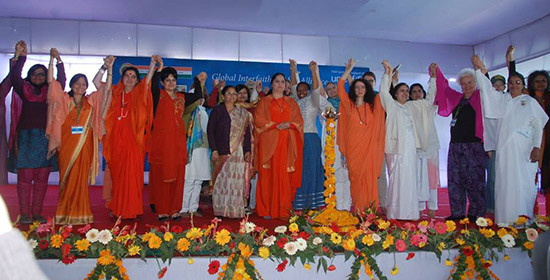Women for WASH Summit at Parmarth
November 30, 2014
An ocean of renowned women leaders from different religions, countries, organisations, and fields came together today at Parmarth Niketan, Rishikesh, on the banks of the holy Ganga to discuss and then commit themselves to play a more active and collaborative role in saving our children, women and communities from death, disease and stunting through better WASH (Water, Sanitation & Hygiene) practices.
The Women for WASH Summit at Parmarth Niketan was part of the first global mega event organised by the Global Interfaith WASH Alliance (GIWA) and Divine Shakti Foundation with the technical support of UNICEF. Pujya Swamiji, Founder of DSF, is Co-Founder/Co-Chairman of GIWA, and Sadhvi Bhagawatiji, President of DSF, is Secretary-General of GIWA.
Over 100 women leaders from India, UK, US, Europe, Indonesia took part in the Summit, the first ever meeting of women faith leaders on WASH, an issue that is of vital and immediate concern to women and children.
The Summit saw the presence of some of the most renowned faith leaders from Hinduism, Islam, Christianity, Judaism, Jainism, Sikhism and Buddhism. Some of the prominent women leaders included:
– Gurumaa Anandmurti
– Mrs. Kiranjot Kaur, formerly the first women member of the Shiromani Gurudwara Prabhandhak Committee (SGPC)
– Sadhvi Bhagwati Saraswati, the Secretary General of GIWA
– Mary Kristin Nelson, Executive Director, Parliament of World’s Religions, Chicago, USA
– Mrs. Vijaya Barthwal, MLA and former Minister of Uttarakhand
– Deepika Singh, Program Director, Religions for Peace, New York, USA
– Kristin Engvig, Founder and President, Women’s International Networking (WIN), Switzerland
– Dr. Binny Sareen of the Brahmakumaris, Mt. Abu
– Sue Coates, WASH chief of UNICEF India
– Kiran Bali, Global Chair, United Religions for Peace, UK
– Mahamandaleshwar Santoshi Ma
– Mahamandaleshwar Maitreyi Giriji
– Suma Verghese, Editor-in-Chief of Life Positive magazine
– Sara Ahmed, Chair, Global Gender and WASH Alliance
– Dr. Husna Ahmed, co-chair of Faiths and Beliefs in Further Education, London among several others.
– Vartika Nanda, journalist, poet and writer
– Rima Gautam, journalist and poet
Sue Coates, from England, WASH chief, UNICEF India said it is high time we looked at the critical role women play and can play in water, sanitation and hygiene. She outlined the immense misery crores of girls and women in India have to go through every day because there are no toilets for them at homes and communities. Girls have to drop out of school upon reaching puberty because there are no safe, clean, dignified and closed toilets in school where they can practice menstrual hygiene.
She established the link between unsafe water, open defecation, non-washing of hands before meals, poor breast feeding practices, child feces and menstrual hygiene with diseases, malnutrition, stunting in children and a range of health problems of women. She said it is time all of us, faith leaders, health workers, social leaders took responsibility for these and resolve to change this.
Sadhvi Bhagawati Saraswati, Secretary General of the Global Interfaith WASH Alliance (GIWA) and President of the Divine Shakti Foundation, pointed out to the women faith leaders present the horror of 1200 children under the age of 5 dying every day in India because of polluted water, poor sanitation and health facilities as well as social behavior. Nearly 30 crore women in India are forced to defecate in the open, inviting violence, rape, assault, shame and acute discomfort as they hold defecation until dark. The lack of facilities for taking care of women’s menstrual hygiene in schools forces them to drop out of school when they begin menstruating, and therefore keeps them uneducated or semi-educated, unhealthy and feeling dirty. This must change. It can change only when women, the entire Nari Shakti, of India come together, speak up and take collective action. She called upon women leaders of all faiths and fields to commit themselves to take concrete action to change attitudes, behaviors and conditions.
Gurumaa Anandmurti from Gannaur, one of the most prominent and popular women religious leaders of India, talked of her pride of being a women and said that every woman is a goddess and needs to be treated as such. She said that her organisation involves 250,000 people in her programme for the education of girls. She promised that she will ensure that all schools in her area have toilets for girls. Underlying the need to take proactive and concrete action on proving WASH to all women urgently, she committed herself and her organisation to it.
Mrs. Kiranjot Kaur from Amritsar said for women religion is a very important part of their lives. So is sanitation, water and hygiene. In Sikhism, a menstruating women is not considered dirty or inferior. She underscored the need for changing mindsets, breaking social taboos and cultural influences that inhibit women. We have to drop old thinking and behavior to save our children and women, she added.
Mrs. Vijaya Barthwal, MLA, thanked Pujya Swami Chidanand Saraswatiji for organizing the GIWA and the Women for WASH Summit. She said the WASH issues should have been India’s top national priority over 60 years ago. Citing the neglect and pollution of Ganga as our treatment of all water bodies she we need a new commitment to set things right.
Dr. Binny Sareen from the Brahmakumari movement informed the gathering the considerable work they are doing for girl education and health, both physical and spiritual. Underscoring the need for balancing both the aspects in our approach to health, she committed to work more for promoting WASH among women as well as their homes.
Dr. Husna Ahmed from Indonesia explained the importance Islam places on water and hygiene. She explained the successful work of Indonesian Muslim Women WASH Alliance in promoting healthy attitudes and behavior. Citing her experience in several countries she stressed the effectiveness of faith communities for WASH.
Mary Kristin Nelson, Executive Director, Council for Parliament of World’s Religions said she was very happy to hear about toilets, sanitation and hygiene by women here. She said to change things we have to speak up, stand up, share our stories, push our cause and make ourselves heard.
Kristin Engvig, Founder President of Women’s International Networking (WIN), lamented that there were very few women who had real power despite women being in parliaments and governments. Our organisation’s aim is to encouraging the feminine principle, to bringing caring, sharing, compassion, support for women to make them win. But for this to happen women themselves have to come forward, get together, collaborate and take collective, bold action. She called upon women to never accept unacceptable behavior.
Kiran Bali, Global Chair, United Religions for Peace, also underscored the importance of women uniting and organizing themselves, educating and engaging women at all levels. United action will have a domino effect, she said. She called upon women to be the change they want to see.
At the end, Pujya Swami Chidanand Saraswatiji, Co-Founder of GIWA and Founder of Divine Shakti Foundation, thanked all the women leaders who came from different parts of the country and the world and lauded their resolve to take the WASH Revolution forward to every home, every school and every community by uniting and using their power as the embodiment of divine feminine power, the Matri Shakti.
Divine Shakti Foundation and the Global Interfaith WASH Summit are dedicated to the cause of clean water and sanitation for all. To learn more about the work DSF is doing, click here.
-
.jpg)
-
Women for WASH Summit (50)
-
View Picture
-
-
.jpg)
-
Women for WASH Summit (51)
-
View Picture
-
-
.jpg)
-
Women for WASH Summit (59)
-
View Picture
-
-
.jpg)
-
Women for WASH Summit (60)
-
View Picture
-
-
.jpg)
-
Women for WASH Summit (66)
-
View Picture
-
-
.jpg)
-
Women for WASH Summit (69)
-
View Picture
-
-
.jpg)
-
Women for WASH Summit (75)
-
View Picture
-
-
.jpg)
-
Women for WASH Summit (79)
-
View Picture
-
-
.jpg)
-
Women for WASH Summit (80)
-
View Picture
-
-
.jpg)
-
Women for WASH Summit (83)
-
View Picture
-
-
.jpg)
-
Women for WASH Summit (22)
-
View Picture
-
-
.jpg)
-
Women for WASH Summit (26)
-
View Picture
-
-
.jpg)
-
Women for WASH Summit (29)
-
View Picture
-
-
.jpg)
-
Women for WASH Summit (44)
-
View Picture
-
-
.jpg)
-
Women for WASH Summit (45)
-
View Picture
-
-
.jpg)
-
Women for WASH Summit (46)
-
View Picture
-



